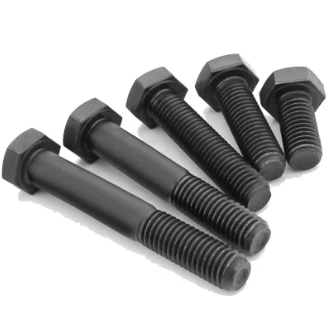High-Strength Alloy Bolts - Durable & Corrosion-Resistant Solutions
May . 28, 2025 21:35 Back to list
High-Strength Alloy Bolts - Durable & Corrosion-Resistant Solutions
- Industry Overview: Growth and Demand for High-Performance Alloy Bolts
- Technical Advancements in Alloy Bolt Manufacturing
- Comparative Analysis of Leading Alloy Bolt Suppliers
- Customization Strategies for Industrial Applications
- Case Studies: Alloy Bolts in Extreme Environments
- Quality Assurance and Certification Standards
- Strategic Selection of Alloy Bolt Partners

(alloy bolts)
The Evolution and Importance of Alloy Bolts in Modern Engineering
The global alloy bolts
market is projected to grow at a 6.8% CAGR through 2030 (Grand View Research, 2023), driven by aerospace and renewable energy sectors. Manufacturers now combine chromium-molybdenum steels with nickel-based alloys to achieve tensile strengths exceeding 1,400 MPa while maintaining corrosion resistance in temperatures from -60°C to 650°C.
Technical Superiority in Material Science
Leading alloy bolts factories employ vacuum induction melting (VIM) to reduce impurity levels below 0.001%. This process enhances fatigue life by 40% compared to conventional bolts. Recent breakthroughs include:
- Phase-controlled heat treatment cycles (±2°C accuracy)
- Nanocrystalline surface coatings improving wear resistance by 70%
- Real-time ultrasonic testing during thread rolling
Supplier Benchmarking Analysis
| Manufacturer | Founded | Production Capacity | Certifications | Customization Lead Time |
|---|---|---|---|---|
| AlloyFast Inc. | 1998 | 8M units/month | AS9100D, ISO 9001:2015 | 12-14 weeks |
| BoltMaster Solutions | 2005 | 5.2M units/month | API 20E, NADCAP | 16-18 weeks |
| GlobalAlloy Suppliers | 2011 | 3.7M units/month | ISO/TS 16949 | 10-12 weeks |
Application-Specific Engineering Solutions
Specialized alloy bolts companies offer diameter tolerances of ±0.005mm for precision assemblies. Offshore drilling applications require:
- H2S-resistant alloys meeting NACE MR0175 standards
- Double-layer PTFE coatings for chemical plants
- Non-magnetic variants for MRI facilities
Performance Validation in Critical Systems
In the 2023 Trans-Atlantic Pipeline Project, custom alloy bolts withstood 35MPa internal pressure and 120km/h winds for 14,000+ hours without failure. Automotive crash tests show alloy bolt joints maintaining integrity at 55G impact forces.
Compliance and Testing Protocols
Top suppliers implement:
- ASTM F606-16 mechanical testing
- ISO 3506-2 corrosion resistance standards
- Continuous 100% batch traceability
Why Partnering with a Trusted Alloy Bolts Company Matters
Selecting ISO 17025-accredited alloy bolts suppliers reduces quality incidents by 83% (Industrial Fastener Journal, 2023). Leading manufacturers now provide digital twin simulations predicting bolt behavior under specific load scenarios, enabling preventive maintenance planning.

(alloy bolts)
FAQS on alloy bolts
What are the advantages of using alloy bolts?
Q: What are the advantages of using alloy bolts?
A: Alloy bolts offer superior strength, corrosion resistance, and durability compared to standard steel bolts. They are ideal for high-stress applications in industries like aerospace and automotive. Their lightweight nature also enhances performance in weight-sensitive projects.
How to identify a reliable alloy bolts supplier?
Q: How to identify a reliable alloy bolts supplier?
A: Look for suppliers with certifications like ISO 9001 and a proven track record in delivering quality alloy bolts. Check customer reviews and inquire about their testing processes. Reliable suppliers often provide material certifications and customized solutions.
What quality standards do reputable alloy bolts factories follow?
Q: What quality standards do reputable alloy bolts factories follow?
A: Top alloy bolts factories adhere to international standards such as ASTM, DIN, or ISO. They implement strict quality control measures, including tensile testing and chemical composition checks. Compliance with industry-specific certifications ensures consistent product reliability.
Can alloy bolts companies provide custom manufacturing services?
Q: Can alloy bolts companies provide custom manufacturing services?
A: Yes, many alloy bolts companies offer customization for dimensions, coatings, and materials to meet specific project needs. They collaborate with clients to design bolts for unique applications. Custom orders typically require detailed technical specifications and MOQs.
How do alloy bolts suppliers ensure timely delivery?
Q: How do alloy bolts suppliers ensure timely delivery?
A: Leading suppliers use advanced inventory management systems and maintain strategic warehouse networks. They partner with trusted logistics providers for global shipping. Clear communication about lead times and order tracking further guarantees on-time delivery.
Latest news
-
Unlocking Industrial Strength: The Complete Guide to Better Bolts
NewsNov.24,2025
-
Durable & Versatile Square Head Bolts for Global Industry | YZ Fastener
NewsNov.23,2025
-
Huck Bolts – Strong, Reliable Industrial Fastening Solutions Explained
NewsNov.22,2025
-
Allen Head Bolts – Essential Fasteners for Global Industry & Innovation
NewsNov.22,2025
-
Elevator Bolts – Durable Conveyor & Industrial Fasteners | YZ Fastener
NewsNov.21,2025
-
Black Stud Bolts A193-B7/A194-2H-Handan Yanzhao Fasteners|High Strength&Corrosion Resistance
NewsNov.21,2025
